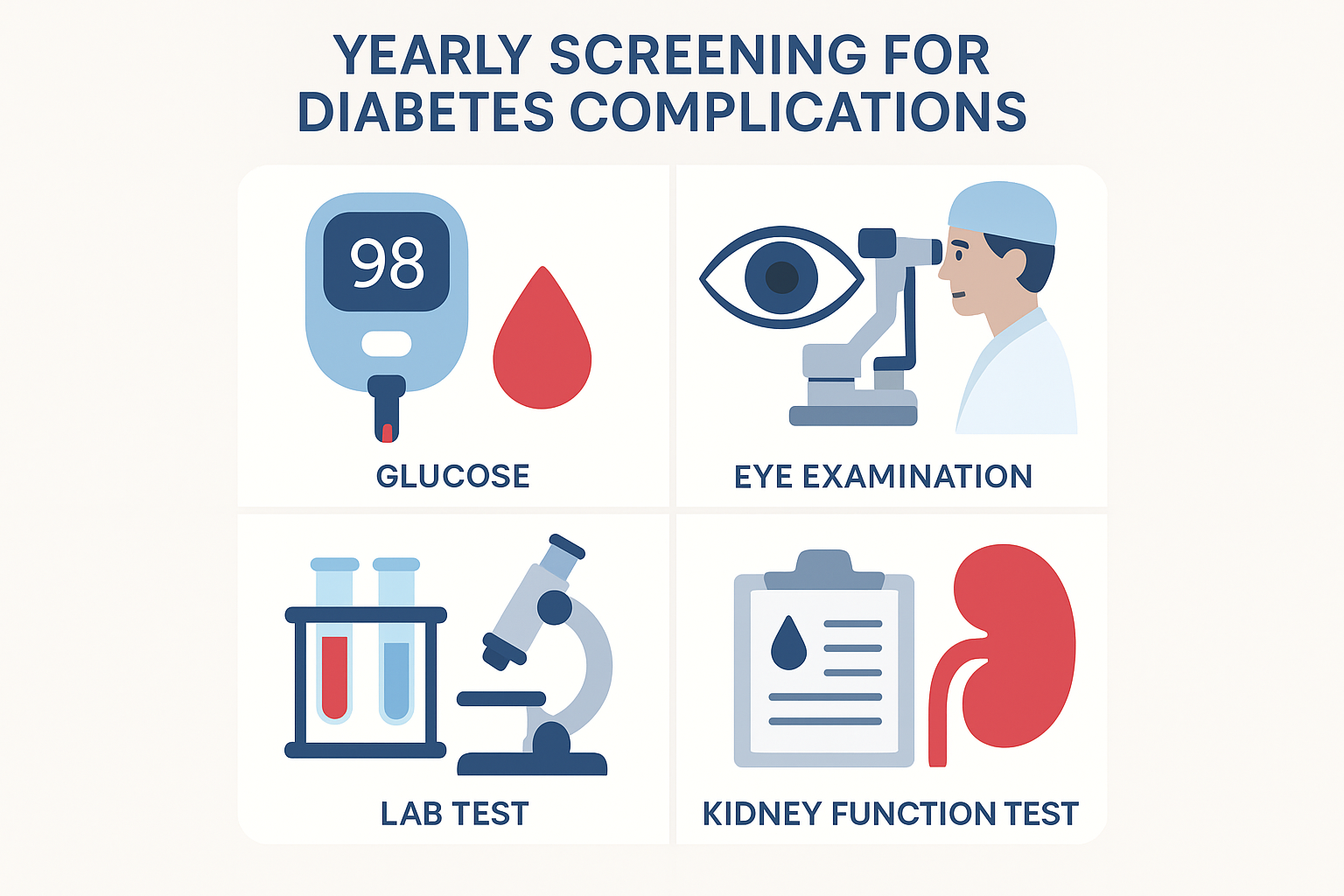Diabetes is a chronic condition that affects millions worldwide. While effective management of blood sugar levels is crucial, regular yearly screenings for diabetes-related complications are equally important. These screenings help detect problems early—before they become severe—allowing timely treatment and preventing irreversible damage.
Why Yearly Screening is Important for People with Diabetes
Diabetes can damage blood vessels, nerves, and vital organs over time, often without noticeable symptoms in the early stages. Regular screening:
- Detects complications early
- Prevents disease progression
- Improves quality of life
- Reduces the risk of disability or premature death
Even if you feel healthy, silent damage can occur, making yearly check-ups essential.
Key Diabetes Complications to Screen For
1. Eye Complications (Diabetic Retinopathy)
- Why it matters: High blood sugar can damage tiny blood vessels in the retina, leading to vision loss or blindness.
- Screening: Dilated eye exam by an ophthalmologist once a year.
- Prevention: Control blood sugar, blood pressure, and cholesterol.
2. Kidney Disease (Diabetic Nephropathy)
- Why it matters: Diabetes is a leading cause of chronic kidney disease (CKD) and kidney failure.
- Screening: Urine albumin-to-creatinine ratio (UACR) and serum creatinine to estimate kidney function (eGFR) annually.
- Prevention: Maintain good blood sugar and blood pressure control.
3. Nerve Damage (Diabetic Neuropathy)
- Why it matters: High blood sugar can damage nerves, especially in the feet, leading to pain, numbness, and infections.
- Screening: Foot exam (checking sensation, skin condition, and circulation) every year.
- Prevention: Regular foot care and prompt treatment of injuries.
4. Cardiovascular Disease Risk
- Why it matters: Diabetes greatly increases the risk of heart disease and stroke.
- Screening: Annual blood pressure check, lipid profile, and lifestyle assessment.
- Prevention: Healthy diet, exercise, weight management, and medications when necessary.
5. Dental and Oral Health
- Why it matters: High blood sugar can lead to gum disease and infections.
- Screening: Dental check-up at least once a year.
- Prevention: Good oral hygiene and regular cleanings.
6. Foot Ulcers and Infections
- Why it matters: Poor circulation and nerve damage can lead to slow-healing wounds, sometimes requiring amputation.
- Screening: Foot examination at every routine diabetes visit; yearly comprehensive foot screening.
- Prevention: Daily self-checks and wearing appropriate footwear.
Checklist: Annual Diabetes Complication Screenings
| Test/Exam | Purpose | Frequency |
|---|---|---|
| Dilated Eye Exam | Detect diabetic retinopathy | Yearly |
| Urine Albumin & Creatinine | Detect kidney damage | Yearly |
| Lipid Profile | Assess heart disease risk | Yearly |
| Blood Pressure Check | Prevent cardiovascular complications | Every visit |
| Foot Exam | Detect neuropathy & poor circulation | Yearly |
| Dental Check-Up | Prevent gum disease | Yearly |
Tips for Preparing for Your Yearly Screening
- Keep a record of your blood sugar readings and medications.
- Make a list of any new symptoms or concerns.
- Bring past lab reports for comparison.
- Discuss lifestyle habits, including diet, exercise, and smoking.
Conclusion
Yearly screening for diabetes complications is not just a medical formality—it’s a life-saving measure. Early detection means better treatment, fewer complications, and a healthier, more active life with diabetes. By committing to these regular check-ups, you’re investing in your long-term health.




